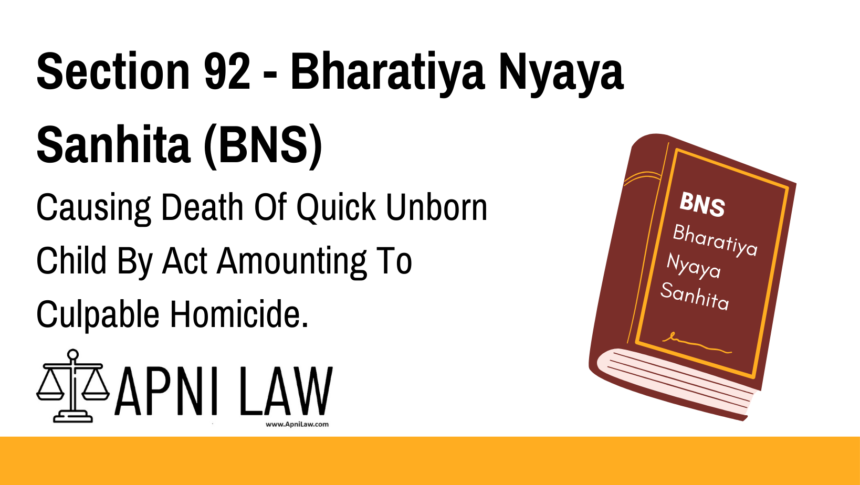Code: Section 92 BNS
Whoever does any act under such circumstances, that if he thereby caused death
he would be guilty of culpable homicide, and does by such act cause the death of a quick
unborn child, shall be punished with imprisonment of either description for a term which may
extend to ten years, and shall also be liable to fine.
Illustration.
A, knowing that he is likely to cause the death of a pregnant woman, does an act
which, if it caused the death of the woman, would amount to culpable homicide. The woman
is injured, but does not die; but the death of an unborn quick child with which she is
pregnant is thereby caused. A is guilty of the offence defined in this section.
Explanation of Section 92 BNS
This provision criminalizes causing the death of a quick unborn child through an act that would otherwise be classified as culpable homicide if it had resulted in the death of a person.
Key Elements of Section 92 BNS
- The accused must commit an act that could amount to culpable homicide – This means the act must be one that could have led to human death if completed.
- The act must cause the death of a “quick unborn child” – The term “quick unborn child” refers to a fetus that has reached the stage where movements are felt by the mother, typically after 16–20 weeks of pregnancy.
- Punishment – The accused faces:
- Imprisonment up to 10 years, and
- Liability to a fine.
Illustrations of Section 92 BNS
Example 1: Physical Assault Leading to the Death of an Unborn Child
A husband, during an argument, physically assaults his pregnant wife, causing severe injuries. Though she survives, the unborn child dies due to the injuries. Since the act could have caused her death, it falls under culpable homicide, and the husband is liable under Section 92 BNS.
Example 2: Reckless Driving Causing the Death of an Unborn Child
A reckless driver hits a pregnant woman with his car, causing a miscarriage. If the accident was severe enough to potentially cause death, the driver may be punished under Section 92 BNS.
Example 3: Medical Negligence Leading to the Death of a Quick Unborn Child
A doctor performs an illegal abortion on a woman whose fetus has reached the quickening stage. The procedure leads to the death of the unborn child. Since the act was done in circumstances that could have led to the mother’s death, it may be classified under culpable homicide, making the doctor liable under Section 92 BNS.
Common Questions and Answers on Section 92 BNS
1. What is meant by a “quick unborn child”?
A quick unborn child is a fetus that has developed to a stage where the mother can feel movements, typically after 16–20 weeks of pregnancy.
2. How is Section 92 BNS different from Section 91 BNS?
- Section 91 BNS punishes acts done with intent to prevent a child from being born alive or to cause death after birth.
- Section 92 BNS specifically punishes acts that result in the death of a quick unborn child under circumstances that would otherwise amount to culpable homicide.
3. What is the punishment under Section 92 BNS?
The punishment includes:
- Imprisonment up to 10 years, and
- Fine.
4. Does this section apply to accidental harm?
No. Section 92 BNS applies only when the act could have amounted to culpable homicide if it had led to a person’s death. Accidental harm may be prosecuted under negligence laws instead.
5. What if the act was done in good faith to save the mother?
If the act was done in good faith for the purpose of saving the mother’s life, it may not be punishable under Section 92 BNS. The intention and circumstances of the act are crucial in determining guilt.
Conclusion
Section 92 BNS ensures legal protection for quick unborn children by criminalizing acts that cause their death under circumstances amounting to culpable homicide. The provision balances justice by imposing a severe penalty (up to 10 years imprisonment and fine) but stops short of imposing the death penalty or life imprisonment.
For detailed legal information, visit ApniLaw today! 🚀











